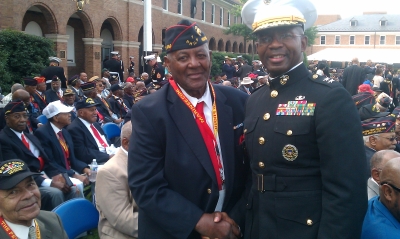Allegheny East Member, First Black Marine, Receives Congressional Medal
 Story by Taashi Rowe
Story by Taashi Rowe
Photo by Ronald Edmonds
“Things in North Carolina were pretty rough. They didn’t want us there anyway,” says Phillip Herout, now 85 years old, recalling his basic training at Montford Point Camp in New River, N.C., which was set up to train the first black Marines. “The place was full of mosquitoes and snakes.” They also lived in substandard housing and suffered abuse from their white drill instructors.
“They made us walk through swamp waters, uphill with our locker bags over our heads,” Herout continues. “They were mean but we understood that in order for us to survive this is what we had to do. We had to put it in our minds that we had to take this. It was part of our training.”
Last month, 70 years after he first enlisted, Herout, a member of Allegheny East Conference’s in Philadelphia, was among some 400 men who traveled to the Marine Barracks in Washington, D.C., to accept Congressional Gold Medals for their service to the United States with the Montford Point Marines.
Until 1942 the United States Marine Corps refused to recruit people of color. President Franklin D. Roosevelt’s creation of the Fair Employment Practices Commission in 1941 forced the corps, to begin recruiting black Marines. The Marines’ first black recruits received basic training at the segregated Montford Point Camp adjacent to Camp Lejeune, and would continue to do so until 1949. More than 20,000 men became the first blacks to serve in the United States Marine Corps.
In supporting the congressional legislation to award the medal, Marine Corps Commandant Gen. James Amos wrote to Congress that the Montford Point Marines “served with distinction in three of the bloodiest battles in the Pacific—Saipan, Iwo Jima and Okinawa,” and, that they “defended a society that enjoyed freedoms they did not share” and “contributed, in large measure, to President Truman’s decision to order the desegregation of the Armed Forces in 1948.”
Despite segregation and racism, Herout, then 15 years old, looks back at his time in the Marines with pride. “I loved it and the rest of the guys loved it also,” he said. “I was just glad and so proud just to be in the Marine Corps. I felt really proud.”
Herout shipped out with the 51st battalion to the Solomon Islands during World War II. He worked in the “ammunition depot” where he was responsible for delivering ammunition where it was needed. He stayed in the Pacific for about a year and a half, until he hurt his hand unloading gas drums and needed extensive treatment. After leaving the Marines in 1949, Herout went on to a career in transportation where he first drove trucks, then buses and then started his own business. Now retired, he didn’t expect any kind of official recognition for his service.
Herout said his wife introduced him to the Seventh-day Adventist Church, and his fellow church members, “are always thanking me, and I appreciate that.” However, when he first heard he and his fellow soldiers would receive this long overdue recognition, Herout said, his voice trembling with emotion, “I never would have imagined this. I always remember what my mom told me, ‘One of these days, it would be so nice if you can smell your roses.’ The sweetest rose I ever got was when they gave me that [medal].”
Receiving the award, the nation’s highest civilian honor, was doubly sweet because it occurred on his birthday, 70 years to the day when he first joined the Marines.
One of the two people allowed to attend the ceremony with him was his good friend, Ronald Edmonds, who pastors the Garden of Prayer church in Baltimore. “It was an extraordinary and humbling experience,” Edmonds said. “To see these old men sitting there, some in wheelchairs and with oxygen tanks, waiting for their due, finally get their recognition was very special.”
Photo: Phillip Herout was one of the first blacks to serve as a Marine. Photo by Ronald Edmonds

Add new comment